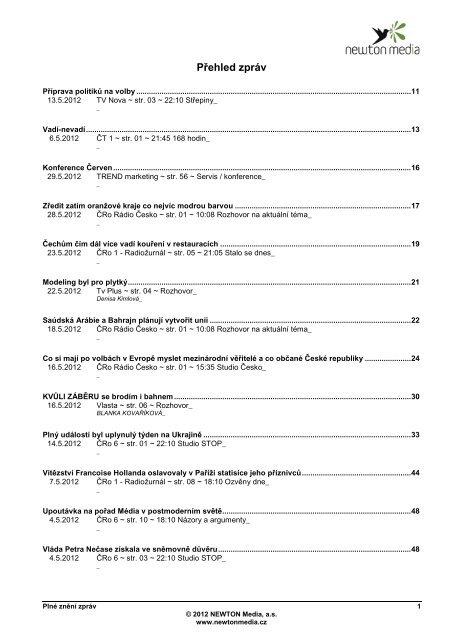
dTest: Right to undisturbed apartment rent - independent tests, more than just reviews
My house, my castle
First of all, it is necessary to start with the rights of the owner of the property, as the tenant's claims often depend on them. Good neighborly relations are considered in advance by the building regulations, which determine, for example, the minimum distances between family houses and the conditions for fencing, planting trees on neighboring plots, and the placement of windows and garages. However, in addition to the rules that apply to our entire territory, we also find customs occurring in specific developments.
The location of the buildings and the use of the neighboring land may cause problems for its users in the future, and thus also for the tenant. The building authority can order the demolition of a building built in the so-called black market, i.e. in violation of building regulations, perhaps also on the basis of a tenant's initiative. However, if the building is in order from a legal point of view, the neighbor does not have to remove it. This is also the case when, for example, the distance from the property boundary is not respected, but the landlord has agreed to the neighbor's construction. Of course, a different situation occurs in the event that the existence of the building or its use threatens or annoys the tenant beyond what is known as a measure proportionate to local conditions.
When a neighbor threatens or disturbs beyond measure
Property users are protected by the provision of civil the code. Technically, such effects are called immission.
For example, a neighbor may not direct rainwater, waste, or otherwise directly endanger or damage his property onto another neighbor's property. However, if emissions arise as a by-product of a neighbor's other activity (e.g. a noisy visit or a smell from a barbecue), their existence must be accepted if they are appropriate to local conditions. The crowing of the rooster will most likely be tolerated in the village, otherwise it will be in the newly built satellite, unless almost everyone keeps chickens in it.
If the tenant is disturbed by the noise, then according to the law he is entitled to a reasonable discount on the rent. But only from the moment the imisi reports, because from that moment the landlord can usually take steps to correct it. Disturbance or nuisance can be considered a defect of the lease, for which the lessor is responsible, and thus he is obliged to remove it, or to give the lessee a discount for its existence. However, the question is the adequacy of the amount of the discount, which would depend on the seriousness of the situation.

However, the landlord can argue that it is a completely normal part of housing. If it were an ongoing renovation of a neighboring apartment, the tenant would most likely not be entitled to a rent discount, unless it took an extremely long time and was very noisy. However, the threat that the tenant might demand a rent discount can often serve to compel the landlord to negotiate.
The landlord should try to come to an agreement with the neighbor first. If they do not reach an agreement, he can file a lawsuit in which he will demand in court that the neighbor stop his disruptive behavior. Alternatively, the neighbor can deal with the immission through the competent authority. Sometimes the landlord is lax in solving the problem with the neighbors because he wants to be on good terms with them or so-called because he does not want to put out what is not burning him. The tenant can therefore secure an undisturbed lease himself, of course by legal means.
How can the tenant defend himself
If there is no reason to talk with the neighbor, the tenant can contact the police or the municipal office, for example, if the nighttime silence is not observed. If a neighbor produces noise of such intensity that it exceeds the legal limits, the regional hygiene station can cut off his tip. If the noise exceeds the above-mentioned level appropriate to the circumstances, the tenant can seek redress in court in the same way as the landlord.
The rate appropriate to the circumstances can also be determined by the house rules applicable to the house in question. The binding nature of house rules is the subject of expert discussions. In any case, the rules of the house rules must not conflict with legal regulations. If that were the case, neither the residents of the house nor the visitors, who are also otherwise covered by the house rules, would have to comply with them. One can come across the opinion that the house rules are also not binding for those residents of the house who have not expressed their consent to them. However, house rules often only contain details of actions that are customary in a given place, i.e. even in a specific building, and it is local conditions that are a standard of behavior that is already binding under the law, and therefore applies to everyone without distinction.
For tenants, it is practical if the house rules are part of the rental agreement, which can be done, for example, by attaching it as an appendix. However, for the tenant, for example, the ban on keeping animals in the house included in the house rules would not apply, since the keeping of animals cannot be prohibited by the tenant according to the Civil Code. As for the owner of the apartment who has committed to complying with the house rules, the ban on keeping animals would already be valid for him. However, for both the owner and the lessee, it is true that the breeding of animals must not harm or endanger anyone, nor must the breeding be disproportionate to local conditions. In a panel housing estate, it will probably not be possible to keep chickens or rabbits on the balcony because of the source of the smell, as it would be the aforementioned emissions.
Short-term rentals for tourists sometimes interfere with peaceful living. The owner of the apartment, who is often not willing to solve the situation, is responsible for non-compliance with order in the house or disturbance of other residents of the house by persons who have been provided with accommodation. This sometimes leads to tense situations in which, in extreme cases, the police are called due to noise, but also vandalism in the house. Around the world, short-term rentals in apartment buildings are often regulated by, for example, determining the number of maximum rental days, licenses or the consent of neighbors, which can partially prevent the problems associated with short-term rentals. Some houses have established an increased fee for apartments in which short-term rentals are operated, or contractual fines for violating house rules, but such fees and contractual fines must be agreed to by all unit owners. Therefore, if there is no reason to talk with the short-term rental provider, the only option is to file a lawsuit in court. Individual disturbances in the house or damage caused must be well documented. If this were only an isolated case, the lawsuit would not be successful. The prerequisite for banning emissions is permanence, i.e. long-term or repeated.
When the tenant disturbs the landlord
In some cases, it can also be the landlord who interferes with the tenant's right to an undisturbed rental of the apartment, for example by constant inspections, but also repairs or modifications to the apartment. According to the law, the landlord has the right to enter the rental apartment if he has a valid reason for doing so. If possible, he should report in advance within a reasonable period of time, which, however, is not precisely defined by law. It is therefore useful to specify it in the rental agreement. The lessor may enter the apartment without notice if there is an imminent danger of damage. Too frequent visits can be annoying and the tenant would be entitled to a rent discount because of them, if they would cause significant inconvenience to him. This would be the case, for example, with a significant number of inspections of the apartment by potential tenants before the end of the lease.
The landlord may also enter the tenant's apartment if the tenant fails to fulfill his obligation to contact the person who will allow the landlord to enter the apartment in situations where the tenant will not be present in the apartment for a longer period of time. In addition to imminent damage to the apartment, the reason for the landlord's entry in such a case could most likely be water or energy readings.
Interference can also be the performance of repairs. These can be carried out by the landlord without the consent of the tenant, if he is obliged to do so by an official decision issued by, for example, the building authority, or if there is a risk of particularly serious damage - an example could be the temporary static securing of the house after a gas explosion, for example in a neighboring apartment or house.
If the tenant's consent is required, he has the right to be informed in advance of construction modifications, or the landlord must also inform him of the need to temporarily leave the apartment. The tenant has the right to a discount on the rent if the repair takes a disproportionately long time or significantly limits the use of the apartment. If he cannot use the apartment for repairs at all, the landlord must pay him the costs of adequate replacement accommodation, or an amount corresponding to the increase in travel costs.







